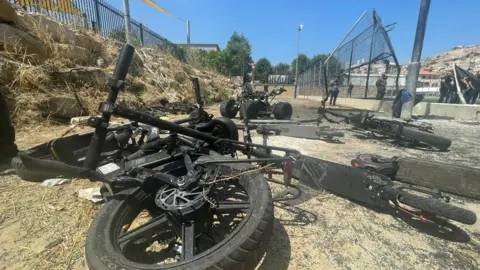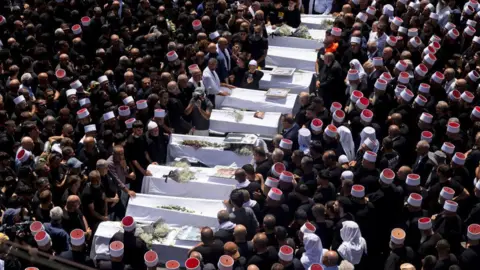Lebanon fears a dangerous new phase in the conflict

 BBC
BBCSince October, regular daily attacks on the border between Israel and Hezbollah, the powerful Iranian-backed militia and political movement in Lebanon, have killed hundreds of people and forced tens of thousands from their homes on both sides, raising fears that the violence contained it can escalate into a full blown conflict.
However, between these strikes and strikes, there were indications that they were trying to avoid a major conflict. But miscalculation was always dangerous, and Saturday’s attack on the Druze town of Majdal Shams, in the Israeli-controlled Golan Heights, could have been just that.
Israel has accused Hezbollah of carrying out a strike on a soccer field that killed at least 12 people, including children, the deadliest attack in the current conflict, and has vowed to respond.
“Israel will not turn a blind eye to this murderous attack,” Israeli Prime Minister Benjamin Netanyahu said, according to a statement issued by his office. “Hezbollah will pay a huge price that it has not paid so far.”
Hezbollah denies responsibility for the attack.
Before the extent of the strike was made clear, the group said it had targeted the Hermon Brigade with an Iranian-made Falaq missile, one of many attacks carried out that day. The site, on the slopes of Mount Hermon, is about 3km (two miles) from where the explosion occurred, suggesting the missile may have missed its target.
Daniel Hagari, a spokesman for the Israeli military, said that intelligence data indicated that the attack was carried out by Hezbollah in Lebanon, describing the group’s denial as “false”.
US Secretary of State Antony Blinken, too, said “all indications” were that the missile was fired by Hezbollah, and that the US stood by “Israel’s right to protect its citizens from terrorist attacks”.
Lebanon is waiting for a possible major reaction from Israel.
 Getty Images
Getty ImagesHezbollah’s strikes began on October 8, the day after a deadly attack by Hamas in Israel, which the group says supports the Palestinians in Gaza. So far, more than 450 people have been killed in Lebanon, including about 350 Hezbollah fighters and at least 100 civilians. In Israel, 23 civilians and at least 17 soldiers were killed.
In Lebanon, most of the Israeli attacks hit the south, where villages were destroyed and abandoned, and the east of the Bekaa Valey, two areas where Hezbollah operates. An Israeli campaign targeting hitherto untouched areas, including parts of the capital Beirut, could lead to a dangerous and unpredictable phase in their fight.
Considered a more formidable adversary than Hamas, Hezbollah has been preparing for another major war with Israel since the last one, in 2006, which caused heavy casualties on both sides. According to Western estimates, the group has about 150,000 rockets and missiles, which can bypass Israel’s sophisticated air defense systems. The arsenal also includes precision-guided missiles capable of striking deep into Israeli territory.
Israeli authorities have repeatedly described the group’s attacks as unacceptable and are under increasing pressure to take steps to allow the return of displaced civilians to northern communities. Military officials said the Israel Defense Forces (IDF) is still conducting major operations against Hamas in Gaza, ready to attack Hezbollah, although details of what that might involve are unclear.
Hassan Nasrallah, Hezbollah’s longtime leader, has repeatedly said that the group does not want an all-out war with Israel, but is ready for one. Last month, he said the group had used only a small portion of its weapons, and warned Israel that any war would be fought “without limits or rules”. A major operation against the group could lead to the involvement of other Iranian-backed militias in the region that are part of what Tehran calls the “Axis of Resistance”.
Any war would have a negative impact on both countries, but especially on Lebanon, which has been in crisis for more than half a decade. The economy has deteriorated as 80% of the population is estimated to be living off handouts, and political conflicts have prevented the election of a president for almost two years. The government has limited influence – if any – over Hezbollah, which, like Hamas, is considered a terrorist organization by the UK, US and others.
But total war is inevitable. Politicians have been trying to prevent a major escalation of the conflict, and Lebanon’s Foreign Minister, Abdallah Bou Habib, told the BBC that authorities were “asking Hezbollah not to retaliate”.
Israel’s foreign ministry spokesman, Oren Marmorstein, said the “only way” to prevent conflict is to use United Nations Resolution 1701, which was approved to end the 2006 war. The document includes the withdrawal of armed groups in southern Lebanon, between the Litani River and the Blue Line, the illegal border with Israel, but was not fully implemented.
Now, Mr Marmorstein said, it was “the last minute” to officially prevent war.
Source link




